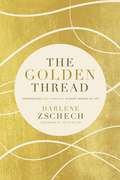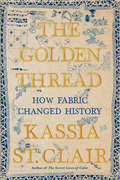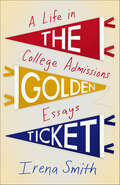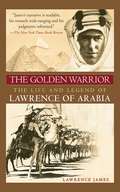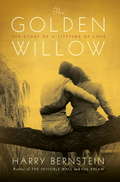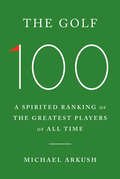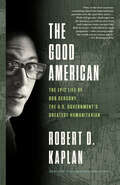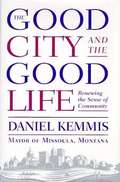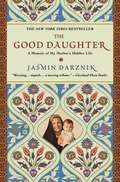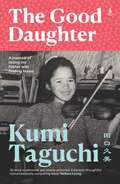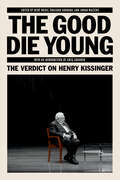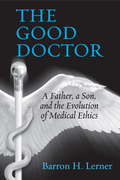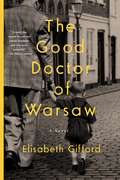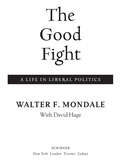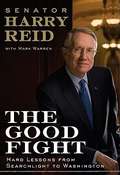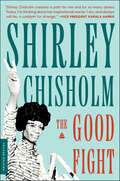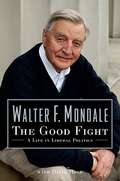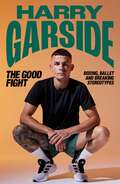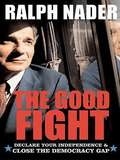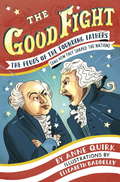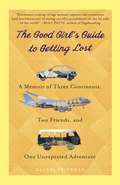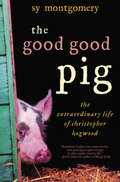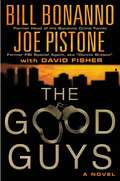- Table View
- List View
The Golden Thread: Experiencing God’s Presence in Every Season of Life
by Joyce Meyer Darlene Zschech“I know your faith will be lifted and increased with this new treasure.”~Chris TomlinDo you feel like you are barely holding on?Let the golden thread of God's presence be the calm on the other side of chaos.It could be that He is weaving a brilliant new beginning in the middle of your mess.Join beloved worship leader Darlene Zschech as she traces God’s goodness through her recent transitions—moving to a new city, starting a church. The songwriter of “Shout to The Lord” urges us to maintain joy in the middle of it all.Rather than seeing her many life changes as a zigzag of unrelated events, Darlene and her family have learned to trace God’s goodness through every crisis—even as she faced the battle for her life, cancer.Your heart will be encouraged, and your faith will soar right along with Darlene’s.
The Golden Thread: How Fabric Changed History
by Kassia St. ClairA Sunday Times (UK) Book of the Year Shortlisted • Society of Authors' Somerset Maugham Award A BBC Radio 4 Book of the Week The best-selling author of The Secret Lives of Color returns with this rollicking narrative of the 30,000-year history of fabric, briskly told through thirteen charismatic episodes. From colorful 30,000-year-old threads found on the floor of a Georgian cave to the Indian calicoes that sparked the Industrial Revolution, The Golden Thread weaves an illuminating story of human ingenuity. Design journalist Kassia St. Clair guides us through the technological advancements and cultural customs that would redefi ne human civilization—from the fabric that allowed mankind to achieve extraordinary things (traverse the oceans and shatter athletic records) and survive in unlikely places (outer space and the South Pole). She peoples her story with a motley cast of characters, including Xiling, the ancient Chinese empress credited with inventing silk, to Richard the Lionhearted and Bing Crosby. Offering insights into the economic and social dimensions of clothmaking—and countering the enduring, often demeaning, association of textiles as “merely women’s work”—The Golden Thread offers an alternative guide to our past, present, and future.
The Golden Ticket: A Life in College Admissions Essays
by Irena SmithWhat do we, as parents, really mean when we say we want the best for our children?Irena Smith tackles this question from a unique vantage point: as a former Stanford admissions officer, a private Palo Alto college counselor, and a mother of three children who struggle to find their place in the long shadow of Stanford University.Written as a series of responses to actual college essay prompts, this witty, raw memoir takes the reader from the smoke-filled lobby of the Hebrew Aid Society in Rome, where Irena and her parents await asylum with other Soviet refugees in 1977, to the overpriced house she and her husband buy in Palo Alto in 1999, to the hushed inner sanctum of the Stanford admissions office. Irena grows a successful college counseling practice but struggles to reconcile the lofty aspirations of tightly wound, competitive high school seniors (and their anxious parents) with her own attempts to keep her family from unraveling as, one by one, her children are diagnosed with autism, learning differences, depression, and anxiety. And although she doesn’t initially understand her children—or how to help them—she will not stop stumbling and learning until she figures it out. The Golden Ticket opens a much-needed conversation about extreme parenting, the weight of generational expectations, and what happens when Gen-X dreams meet unexpected realities. It's a sharp-eyed depiction of hard-won triumphs and of the messy, challenging parts of parenting you won't see on Facebook or Instagram. Above all, it's an invitation to embrace a broader, more generous definition of success.
The Golden Warrior
by Lawrence JamesDuring the 1920s, T. E. Lawrence gained global attention, both for his involvement in the Middle Eastern anti-imperialist movement, and for his vivid and sensational writings about his experiences. Despite the passage of many years and the emergence of a whole new set of problems in the Middle East, and fuelled by the success of the hit movie Lawrence of Arabia, the T. E. Lawrence mystique continues to fascinate. Controversial and provocative, this revised and updated edition of Lawrence James's acclaimed biography penetrates and overturns the mythology that surrounds T. E. Lawrence. James traces the sometimes spurious Lawrence legend back to its truthful roots, yet remains dispassionate and generous in spirit throughout. The Golden Warrior presents readers with a fascinating study of one of the twentieth century's most remarkable figures.
The Golden Willow: The Story of a Lifetime of Love
by Harry BernsteinHarry Bernstein started chronicling his life at the age of ninety-four, after the death of his beloved wife, Ruby. In his first book, The Invisible Wall, he told a haunting story of forbidden love in World War I-era England. Then Bernstein wrote The Dream, the touching tale of his family's immigrant experience in Depression-era Chicago and New York. Now Bernstein completes the saga with The Golden Willow, a heart-lifting memoir of his life with Ruby, a romance that lasted nearly seventy years.They met at a dance at New York's legendary Webster Hall, fell instantly and madly in love, and embarked on a rich and rewarding life together. From their first tiny rented room on the Upper West Side to their years in Greenwich Village, immersed in the art scene, surrounded by dancers, musicians, and writers, to their life in the newly burgeoning suburbs, Harry and Ruby pursued the American dream with gusto, much as Harry's late mother would have wanted.Together, through a depression, a world war, and the McCarthy era, through job losses and race riots and the joyous births of their two children, Harry and Ruby weathered much and shared an incredible love. But then the inevitable happened. One of them had to go first. When Ruby was ninety-one, she contracted leukemia and died. Alone for the first time in his life, Harry felt the loss acutely and terribly, and for a long while, despite continued good health, he was uncertain about whether he could go on without Ruby. It was then that he turned to the past for solace-and ended up fulfilling a lifelong dream of becoming a published author.Delightful and hopeful, tender and moving, The Golden Willow is Harry's tribute to his beloved Ruby, to their long, happy life together, to the impact her parting had on his heart and his soul, and to the surprises and unexpected pleasures that continue to await him.From the Hardcover edition.
The Golem: The Story of a Legend
by Elie Wiesel Anne BorchardtFor centuries, Jews have remembered the Golem, a creature of clay said to have been given life by the mystical incantations of the mysterious Maharal, Rabbi Yehuda Loew, leader of the Jewish community of 16th-century Prague. Some versions have the Golem as a lovable, clumsy mute; others as a monster like Frankenstein's who turned against his creator, giving a vivid warning against magic and the occult. In this beautiful book, Elie Wiesel has collected many of the legends associated with this enigmatic and elusive figure and retold them as seen through the eyes of a wizened gravedigger who claims to have witnessed as a child the numerous miracles that legend attributes to the Golem. "I, Reuven, son of Yaakov," he begins, "declare under oath that 'Yossel the mute,' the 'Golem made of clay,' deserves to be remembered by our people, our persecuted and assassinated, and yet immortal people, We owe it to him to evoke his fate with love and gratitude ... He was a savior, I tell you." Reuven's Golem is no fool or monster, but a figure of intuition, intelligence, and compassion who may yet return, perhaps in our own generation, to protect the Jews from their enemies.
The Golf 100: A Spirited Ranking of the Greatest Players of All Time
by Michael ArkushA rollicking ranking of the greatest golfers of all time, past and present, brimming with the intimate stories and perspective only a longtime golf writer like Michael Arkush can muster.So, who&’s the best of 'em all? Tiger Woods? Jack Nicklaus? Bobby Jones? Ben Hogan? Golf fans will disagree until the end of time, but one thing is certain: For well over 100 years, the sport has provided its share of spectacular careers and indelible moments. And what about fan favorites such as Phil Mickelson, Nancy Lopez, and Lee Trevino? Where do they rank on the list? Or modern players like Scottie Scheffler, Rory McIlroy, Xander Schauffele, Jordan Spieth, Nelly Korda, and Justin Thomas. Did they make the final cut—and if so, where?In a joyride through golf history itself, New York Times bestselling author Michael Arkush establishes a ranking system that places a heavy emphasis on the game&’s major championships and profiles the most accomplished and impactful golfers ever—men and women, known and unknown. Arkush captures the flair, as well as the flaws, of athletes who are intensely competitive, funny, peculiar, or larger-than-life. Crafted from hundreds of interviews and longtime relationships developed over a quarter century, The Golf 100 is an immensely entertaining read.
The Good American: The Epic Life of Bob Gersony, the U.S. Government's Greatest Humanitarian
by Robert D. KaplanFrom the New York Times bestselling author of The Revenge of Geography comes a sweeping yet intimate story of the most influential humanitarian you&’ve never heard of—Bob Gersony, who spent four decades in crisis zones around the world.&“This graceful study of a courageous and humble man reminds us that history can be made, and lives can be saved, by diplomats who know how to reconcile the good with the possible.&”—Timothy Snyder, author of The Road to Unfreedom and On Tyranny In his long career as an acclaimed journalist covering the &“hot&” moments of the Cold War and its aftermath, bestselling author Robert D. Kaplan often found himself crossing paths with Bob Gersony, a consultant for the U.S. State Department whose quiet dedication and consequential work made a deep impression on Kaplan.Gersony, a high school dropout later awarded a Bronze Star for his service in Vietnam, conducted on-the-ground research for the U.S. government in virtually every war and natural-disaster zone in the world. In Thailand, Central and South America, Sudan, Chad, Mozambique, Rwanda, Gaza, Bosnia, North Korea, Iraq, and beyond, Gersony never flinched from entering dangerous areas that diplomats could not reach, sometimes risking his own life. Gersony&’s behind-the scenes fact-finding, which included interviews with hundreds of refugees and displaced persons from each war zone and natural-disaster area, often challenged the assumptions and received wisdom of the powers that be, on both the left and the right. In nearly every case, his advice and recommendations made American policy at once smarter and more humane—often dramatically so.In Gersony, Kaplan saw a powerful example of how American diplomacy should be conducted. In a work that exhibits Kaplan&’s signature talent for combining travel and geography with sharp political analysis, The Good American tells Gersony&’s powerful life story. Set during the State Department&’s golden age, this is a story about the loneliness, sweat, and tears and the genuine courage that characterized Gersony&’s work in far-flung places. It is also a celebration of ground-level reporting: a page-turning demonstration, by one of our finest geopolitical thinkers, of how getting an up-close, worm&’s-eye view of crises and applying sound reason can elicit world-changing results.
The Good City and the Good Life
by Daniel KemmisThe copyright holder and the copyright date were wrong. I've corrected them.
The Good Daughter: A Memoir of My Mother's Hidden Life
by Jasmin DarznikWe were a world of two, my mother and I, until I started turning into an American girl. That's when she began telling me about The Good Daughter. It became a taunt, a warning, an omen.Jasmin Darznik came to America from Iran when she was only three years old, and she grew up knowing very little about her family's history. When she was in her early twenties, on a day shortly following her father's death, Jasmin was helping her mother move; a photograph fell from a stack of old letters. The girl pictured was her mother. She was wearing a wedding veil, and at her side stood a man whom Jasmin had never seen before.At first, Jasmin's mother, Lili, refused to speak about the photograph, and Jasmin returned to her own home frustrated and confused. But a few months later, she received from her mother the first of ten cassette tapes that would bring to light the wrenching hidden story of her family's true origins in Iran: Lili's marriage at thirteen, her troubled history of abuse and neglect, and a daughter she was forced to abandon in order to escape that life. The final tape revealed that Jasmin's sister, Sara - The Good Daughter - was still living in Iran.In this sweeping, poignant, and beautifully written memoir, Jasmin weaves the stories of three generations of Iranian women into a unique tale of one family's struggle for freedom and understanding. The result is an enchanting and unforgettable story of secrets, betrayal, and the unbreakable mother-daughter bond.
The Good Daughter: A memoir of losing my father and finding home
by Kumi Taguchi'At once so personal, yet utterly universal. A visceral, thoughtful and emotionally compelling story.' Melissa Leong In a beautifully crafted memoir of captivating emotional honesty, the SBS Insight host sets out to understand the dad she never really knew, and – along the way – herself. Growing up, Kumi Taguchi thought her father was merely distant: reserved, obsessively frugal and – after her parents&’ divorce – almost entirely missing. When he died, Kumi&’s feelings about him and the Japanese heritage he had given her remained tangled. But just because a parent has gone doesn&’t mean they&’re absent. Over time Kumi came to understand more about what made her father as he was, including his experiences as a child in wartime Japan and, above all, the culture she both loved and felt burdened by. She decided to travel to Japan to find the family home, and perhaps lay to rest some ghosts. In this highly evocative journey of understanding, Kumi explores her divided self: the tension between duty and freedom; the people she&’s felt drawn to and lost; and how to find your place when caught between two worlds.
The Good Die Young: The Verdict on Henry Kissinger
by Bhaskar Sunkara René Rojas Jonah Walters"The collection strikes a blackly comic but erudite tone."–Sophia Nguyen, The Washington PostKissinger is dead but his blood-soaked legacy enduresIf the American foreign policy establishment is a grand citadel, then Henry Kissinger is the ghoul haunting its hallways. For half a century, he was an omnipresent figure in war rooms and at press briefings, dutifully shepherding the American empire through successive rounds of growing pains. For multiple generations of anti-war activists, Kissinger personified the depravity of the American war machine.The world Kissinger wrought is the world we live in, where ideal investment conditions are generated from the barrel of a gun. Today, global capitalism and United States hegemony are underwritten by the most powerful military ever devised. Any political vision worth fighting for must promise an end to the cycle of never-ending wars afflicting the world in the twenty-first century. And breaking that cycle means placing the twin evils of capitalism and imperialism in our crosshairs.In this book, Jacobin follows Kissinger&’s fiery trajectory around the world — not because he was evil incarnate, but because he, more than any other public figure, illustrates the links between capitalism, empire, and the feedback loop of endless war-making that still plagues us today.
The Good Doctor
by Barron H. LernerThe story of two doctors, a father and son, who practiced in very different times and the evolution of the ethics that profoundly influence health care As a practicing physician and longtime member of his hospital's ethics committee, Dr. Barron Lerner thought he had heard it all. But in the mid-1990s, his father, an infectious diseases physician, told him a stunning story: he had physically placed his body over an end-stage patient who had stopped breathing, preventing his colleagues from performing cardiopulmonary resuscitation, even though CPR was the ethically and legally accepted thing to do. Over the next few years, the senior Dr. Lerner tried to speed the deaths of his seriously ill mother and mother-in-law to spare them further suffering. These stories angered and alarmed the younger Dr. Lerner--an internist, historian of medicine, and bioethicist--who had rejected physician-based paternalism in favor of informed consent and patient autonomy. The Good Doctor is a fascinating and moving account of how Dr. Lerner came to terms with two very different images of his father: a revered clinician, teacher, and researcher who always put his patients first, but also a physician willing to "play God," opposing the very revolution in patients' rights that his son was studying and teaching to his own medical students. But the elder Dr. Lerner's journals, which he had kept for decades, showed the son how the father's outdated paternalism had grown out of a fierce devotion to patient-centered medicine, which was rapidly disappearing. And they raised questions: Are paternalistic doctors just relics, or should their expertise be used to overrule patients and families that make ill-advised choices? Does the growing use of personalized medicine--in which specific interventions may be best for specific patients--change the calculus between autonomy and paternalism? And how can we best use technologies that were invented to save lives but now too often prolong death? In an era of high-technology medicine, spiraling costs, and health-care reform, these questions could not be more relevant. As his father slowly died of Parkinson's disease, Barron Lerner faced these questions both personally and professionally. He found himself being pulled into his dad's medical care, even though he had criticized his father for making medical decisions for his relatives. Did playing God--at least in some situations--actually make sense? Did doctors sometimes "know best"? A timely and compelling story of one family's engagement with medicine over the last half century, The Good Doctor is an important book for those who treat illness--and those who struggle to overcome it.From the Hardcover edition.
The Good Doctor of Warsaw
by Elisabeth GiffordSet in the ghettos of wartime Warsaw, this is a sweeping, poignant, and heartbreaking novel inspired by the true story of one doctor who was determined to protect two hundred Jewish orphans from extermination.Deeply in love and about to marry, students Misha and Sophia flee a Warsaw under Nazi occupation for a chance at freedom. Forced to return to the Warsaw ghetto, they help Misha's mentor, Dr Janusz Korczak, care for the two hundred children in his orphanage. As Korczak struggles to uphold the rights of even the smallest child in the face of unimaginable conditions, he becomes a beacon of hope for the thousands who live behind the walls. As the noose tightens around the ghetto, Misha and Sophia are torn from one another, forcing them to face their worst fears alone. They can only hope to find each other again one day . . . Meanwhile, refusing to leave the children unprotected, Korczak must confront a terrible darkness.
The Good Fight
by David Hage Walter MondaleFormer vice president Walter Mondale makes a passionate, timely argument for American liberalism in this revealing and momentous political memoir.For more than five decades in public life, Walter Mondale has played a leading role in America's movement for social change--in civil rights, environmentalism, consumer protection, and women's rights--and helped to forge the modern Democratic Party. In The Good Fight, Mondale traces his evolution from a young Minnesota attorney general, whose mentor was Senator Hubert H. Humphrey, into a U.S. senator himself. He was instrumental in pushing President Johnson's Great Society legislation through Congress and battled for housing equality, against poverty and discrimination, and for more oversight of the FBI and CIA. Mondale's years as a senator spanned the national turmoil of the Nixon administration; its ultimate self-destruction in the Watergate scandal would change the course of his own political fortunes. Chosen as running mate for Jimmy Carter's successful 1976 campaign, Mondale served as vice president for four years. With an office in the White House, he invented the modern vice presidency; his inside look at the Carter administration will fascinate students of American history as he recalls how he and Carter confronted the energy crisis, the Iran hostage crisis, the Soviet invasion of Afghanistan, and other crucial events, many of which reverberate to the present day. Carter's loss to Ronald Reagan in the 1980 election set the stage for Mondale's own campaign against Reagan in 1984, when he ran with Geraldine Ferraro, the first woman on a major party ticket; this progressive decision would forever change the dynamic of presidential elections. With the 1992 election of President Clinton, Mondale was named ambassador to Japan. His intriguing memoir ends with his frank assessment of the Bush-Cheney administration and the first two years of the presidency of Barack Obama. Just as indispensably, he charts the evolution of Democratic liberalism from John F. Kennedy to Clinton to Obama while spelling out the principles required to restore the United States as a model of progressive government. The Good Fight is replete with Mondale's accounts of the many American political heavyweights he encountered as either an ally or as an opponent, including JFK, Johnson, Humphrey, Nixon, Senator Edward M. Kennedy, the Reverend Jesse Jackson, Senator Gary Hart, Reagan, Clinton, and many others. Eloquent and engaging, The Good Fight illuminates Mondale's philosophies on opportunity, governmental accountability, decency in politics, and constitutional democracy, while chronicling the evolution of a man and the country in which he is lucky enough to live.
The Good Fight
by Harry Reid Mark WarrenAfter a childhood of shocking poverty, Harry Reid completed law school, working as a policeman to pay his way. He faced death threats as the head of the Nevada Gaming Commission trying to clean up Las Vegas. Eventually he rose to become Senate Majority Leader in Washington-without ever forgetting the mining town he came from, or the battles he fought along the way. This is that rare book by a politician that is more than a glorified press release. It is an extraordinary American story-told in a voice that is flinty, real, and filled with passion.
The Good Fight
by Shirley ChisholmThe revered civil rights activist and pioneering member of Congress chronicles her groundbreaking 1972 run for President as the first woman and person of color—a work of immense historical importance that both captures and transcends its times, newly reissued to commemorate the fiftieth anniversary of her campaign.“Shirley Chisholm's fearless determination has been an inspiration to so many of us.” —Regina KingBefore Kamala Harris, before Hillary Rodham Clinton there was Shirley Chisholm. In 1972, the Congresswoman from New York—the first Black woman elected to Congress—made history again when she announced her candidacy for President of the United States. Though she understood victory was a longshot, Chisholm chose to run “because someone had to do it first. . . . I ran because most people think the country is not ready for a black candidate, not ready for a woman candidate.” In this invaluable political memoir, Chisholm reflects on her unique campaign and a nation at the crossroads of change. With the striking candor and straightforward style for which she was famous, Chisholm reveals the essential wheeling and dealing inherent to campaigning, castigates the innate conservatism and piety of the Black majority of the period, decries identity politics that lead to destructive power struggles within a fractious Democratic Party, and offers prescient advice on the direction of Black politics. From the whirlwind of the primaries to the final dramatic maneuvering at the tumultuous 1972 Democratic National Convention, The Good Fight is an invaluable portrait of twentieth-century politics and a Democratic Party in flux.Most importantly, The Good Fight is the portrait of a reformer who dedicated her life to making politics work for all Americans. Chisholm saw her campaign as an extension of her political commitment; she ran as an idealist grounded in reality who used her opportunity and position to give voice to all the forgotten. This book bears the stamp of her remarkable personality and her commitment to speaking truth no matter the consequences.Look out for the biopic Shirley, directed by John Ridley and starring Regina King, coming in March 2024.
The Good Fight: A Life in Liberal Politics
by Walter F. Mondale David HageFormer vice president Walter Mondale makes a passionate, timely argument for American liberalism in this revealing and momentous political memoir. For more than five decades in public life, Walter Mondale has played a leading role in America's movement for social change; in civil rights, environmentalism, consumer protection, and women's rights; and helped to forge the modern Democratic Party. In The Good Fight, Mondale traces his evolution from a young Minnesota attorney general, whose mentor was Senator Hubert H. Humphrey, into a U. S. senator himself. He was instrumental in pushing President Johnson's Great Society legislation through Congress and battled for housing equality, against poverty and discrimination, and for more oversight of the FBI and CIA. Mondale's years as a senator spanned the national turmoil of the Nixon administration; its ultimate self-destruction in the Watergate scandal would change the course of his own political fortunes. Chosen as running mate for Jimmy Carter's successful 1976 campaign, Mondale served as vice president for four years. With an office in the White House, he invented the modern vice presidency; his inside look at the Carter administration will fascinate students of American history as he recalls how he and Carter confronted the energy crisis, the Iran hostage crisis, the Soviet invasion of Afghanistan, and other crucial events, many of which reverberate to the present day. Carter's loss to Ronald Reagan in the 1980 election set the stage for Mondale's own campaign against Reagan in 1984, when he ran with Geraldine Ferraro, the first woman on a major party ticket; this progressive decision would forever change the dynamic of presidential elections. With the 1992 election of President Clinton, Mondale was named ambassador to Japan. His intriguing memoir ends with his frank assessment of the Bush-Cheney administration and the first two years of the presidency of Barack Obama. Just as indispensably, he charts the evolution of Democratic liberalism from John F. Kennedy to Clinton to Obama while spelling out the principles required to restore the United States as a model of progressive government. The Good Fight is replete with Mondale's accounts of the many American political heavyweights he encountered as either an ally or as an opponent, including JFK, Johnson, Humphrey, Nixon, Senator Edward M. Kennedy, the Reverend Jesse Jackson, Senator Gary Hart, Reagan, Clinton, and many others. Eloquent and engaging, The Good Fight illuminates Mondale's philosophies on opportunity, governmental accountability, decency in politics, and constitutional democracy, while chronicling the evolution of a man and the country in which he is lucky enough to live.
The Good Fight: Boxing, ballet and breaking stereotypes
by Harry GarsideUh oh, here&’s another celebrity wanker with a self-help book telling everyone how to live their lives. Don&’t worry. It&’s not. I can&’t think of anything worse to read, let alone write, so I won&’t subject you to that. In The Good Fight, Harry Garside, Australia&’s ballet dancing boxing star, offers a raw account of his journey through sport, unexpected challenges and personal growth. Harry opens up about his remarkable journey with wit and wisdom, and offers a refreshing perspective on masculinity, sharing his struggles, triumphs, and moments of profound self-discovery. Having won both gold and bronze medals at the Commonwealth and Tokyo Olympic games respectively, and playing a starring role at the 2024 Olympics, Harry is one of Australia&’s stand-out boxing talents. Through personal anecdotes and heartfelt poetry, Garside invites readers to see beyond the stereotypes, offering a nuanced exploration of identity, resilience, and showing how to be comfortable in your own skin.
The Good Fight: Declare Your Independence & Close the Democracy Gap
by Ralph NaderReflections of a political independent who has staged two runs for president. Naderwrites about corporate government, civic motivation, campaigning, civil liberties, trial, the multiple party system, and more.
The Good Fight: The Feuds of the Founding Fathers (and How They Shaped the Nation)
by Anne Quirk Elizabeth BaddeleyCan’t get enough of Hamilton? Think the British were the only ones we squabbled with during the Revolutionary War? Think again! A unique look at how the founding fathers settled their differences in their quest to settle a nation. The Revolutionary War was full of bloody battles and broken treaties. But it wasn’t just about the colonies fighting the crown. In the 18th century, it seemed that everyone was at war with each other—including the very people who were supposedly leading us on a path to independence! Don’t miss out on a ringside seat for these fascinating bouts: • Benjamin Franklin’s son William was once jailed on accusations of being a traitor . . . and Ben didn’t even visit him. • Thomas Jefferson quit his job as secretary of state because his archrival, Alexander Hamilton, started the national bank. • John Adams and Thomas Jefferson died on the same day. Could it have been mutual exhaustion after years of disagreement? George Washington vs. King George. Benjamin Franklin vs. his son William. John Adams vs. Thomas Jefferson. Alexander Hamilton vs. everyone! Join historian Anne Quirk and illustrator Elizabeth Baddeley as they referee four fascinating historical throw-downs between the founding fathers . . . and prove that the United States of America is a place worth fighting for.
The Good Food Revolution: Growing Healthy Food, People, and Communities
by Charles Wilson Will AllenA pioneering urban farmer and MacArthur “Genius Award” winner points the way to building a new food system that can feed—and heal—broken communities. The son of a sharecropper, Will Allen had no intention of ever becoming a farmer himself. But after years in professional basketball and as an executive for Kentucky Fried Chicken and Procter & Gamble, Allen cashed in his retirement fund for a two-acre plot a half mile away from Milwaukee’s largest public housing project. The area was a food desert with only convenience stores and fast-food restaurants to serve the needs of local residents. In the face of financial challenges and daunting odds, Allen built the country’s preeminent urban farm—a food and educational center that now produces enough vegetables and fish year-round to feed thousands of people. Employing young people from the neighboring housing project and community, Growing Power has sought to prove that local food systems can help troubled youths, dismantle racism, create jobs, bring urban and rural communities closer together, and improve public health. Today, Allen’s organization helps develop community food systems across the country. An eco-classic in the making, The Good Food Revolution is the story of Will’s personal journey, the lives he has touched, and a grassroots movement that is changing the way our nation eats. .
The Good Girl's Guide to Getting Lost: A Memoir of Three Continents, Two Friends, and One Unexpected Adventure
by Rachel FriedmanRachel Friedman has always been the consummate good girl who does well in school and plays it safe, so the college grad surprises no one more than herself when, on a whim (and in an effort to escape impending life decisions), she buys a ticket to Ireland, a place she has never visited. There she forms an unlikely bond with a free-spirited Australian girl, a born adventurer who spurs Rachel on to a yearlong odyssey that takes her to three continents, fills her life with newfound friends, and gives birth to a previously unrealized passion for adventure. As her journey takes her to Australia and South America, Rachel discovers and embraces her love of travel and unlocks more truths about herself than she ever realized she was seeking. Along the way, the erstwhile good girl finally learns to do something she's never done before: simply live for the moment.From the Trade Paperback edition.
The Good Good Pig: The Extraordinary Life of Christopher Hogwood
by Sy Montgomery“Christopher Hogwood came home on my lap in a shoebox. He was a creature who would prove in many ways to be more human than I am.”–from The Good Good PigA naturalist who spent months at a time living on her own among wild creatures in remote jungles, Sy Montgomery had always felt more comfortable with animals than with people. So she gladly opened her heart to a sick piglet who had been crowded away from nourishing meals by his stronger siblings. Yet Sy had no inkling that this piglet, later named Christopher Hogwood, would not only survive but flourish–and she soon found herself engaged with her small-town community in ways she had never dreamed possible. Unexpectedly, Christopher provided this peripatetic traveler with something she had sought all her life: an anchor (eventually weighing 750 pounds) to family and home.The Good Good Pig celebrates Christopher Hogwood in all his glory, from his inauspicious infancy to hog heaven in rural New Hampshire, where his boundless zest for life and his large, loving heart made him absolute monarch over a (mostly) peaceable kingdom. At first, his domain included only Sy’s cosseted hens and her beautiful border collie, Tess. Then the neighbors began fetching Christopher home from his unauthorized jaunts, the little girls next door started giving him warm, soapy baths, and the villagers brought him delicious leftovers. His intelligence and fame increased along with his girth. He was featured in USA Today and on several National Public Radio environmental programs. On election day, some voters even wrote in Christopher’s name on their ballots.But as this enchanting book describes, Christopher Hogwood’s influence extended far beyond celebrity; for he was, as a friend said, a great big Buddha master. Sy reveals what she and others learned from this generous soul who just so happened to be a pig–lessons about self-acceptance, the meaning of family, the value of community, and the pleasures of the sweet green Earth. The Good Good Pig provides proof that with love, almost anything is possible.From the Hardcover edition.
The Good Guys
by David Fisher Bill Bonanno Joe PistoneThe authors' extraordinary lives and experiences infuse this novel with chilling true-to-life details and a real insider's perspective. Bonanno is a former high-ranking member of a crime family, and Pistone is a former undercover FBI agent.
